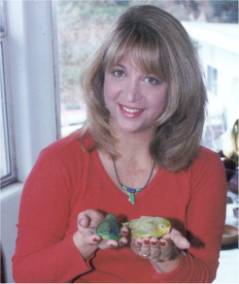Hi Sandee:
I have a Pacific Parrotlet who is just over one year of age. She had a medical crisis on Wednesday that we fortunately caught in time that turned out to be egg yolk perionitis. She's going to be fine now ($500.00 and a lot of worry later!) but the vet says that it's unusual for this to happen in a younger bird. I am of course concerned that this is going to become a regular occurrence now that she's clearly sexually mature. We do cover her cage so that she only gets 12 hours of light a day, and there is no nest box or anything like that in her cage. The vet thinks that one thing that may help is to get her on pellets instead of the Volkman's parrotlet blend she's currently on, as he says the seeds are too high in fat and that can trigger ovulation. But he doesn't see many parrotlets and he's been on me to put her on pellets since the first time we went there even though from what I read a high quality seed blend and lots of fresh food (which she gets and eats) is better for the bird.
What do you think? Will pellets help? Was the egg yolk perionitis just a fluke? Is there any thing I can do more than I'm already doing to ensure that she doesn't lay another egg - she had one lupron shot and gets another in a few weeks to stop it for now but what about next year?
Thanks.
Monica
Dear Monica:
Thank you for your email. I tried calling you this AM as you have requested a lot of info and I felt it would be better communicating by phone rather than email. I will tell you have several articles on my website about pellets, Lupron and I even think egg laying pet hens that have no males with them. I do know all of these subjects are thoroughly covered in my books, especially the latest one, The Parrotlet Handbook published by Barron’s.
It is unusual for a hen to have egg yolk peritonitis at a young age but I sincerely doubt that has anything to do with diet. First, ovulation is a natural process in birds and doesn’t need ‘fat’ to trigger it. Second, seeds are a natural part of a bird’s diet – there are no pellet trees in the wild. Also, pellets are simply processed seeds with artificial colors and flavors. I don’t eat processed foods and no one will ever convince me that feeding processed foods to our birds is better than feeding fresh fruits, vegetables, seeds, grains, legumes and sprouts. Even pellet manufacturers, the honest ones anyway, will tell you they can’t MAKE a pellet more nutritious than a diet rich in whole foods.
No one can tell you whether or not this was a ‘fluke’ with your bird or if it has some kind of congenital issue or if was triggered by environmental changes. Only time will tell. As for lupron, well, I have an article about it on my site that is based on dozens of vets opinion’s not just one. If the bird is a color mutation, it is more likely this is a birth defect or even genetic abnormality but only time will tell. I will say that reducing daylight hours to less than 12, keeping nest like structures out of the cage and feeding a diet rich in fresh, whole foods is a much better preventive measure than lupron shots or pellets, in my opinion, which is based on 30 years of keeping parrotlets.
Hope this helps and if you wish to discuss this further, please do not hesitate to contact me!
Sincerely yours,
Sandee L. Molenda, C.A.S.
The Parrotlet Ranch, Owner, www.parrotletranch.com
Join the International Parrotlet Society, – the World’s Largest and Oldest Parrotlet Organization www.internationalparrotletsociety.org
A Chattering Bird Builds No Nest.
Camaroonian Phrase
Saturday, February 25, 2012
Subscribe to:
Posts (Atom)



